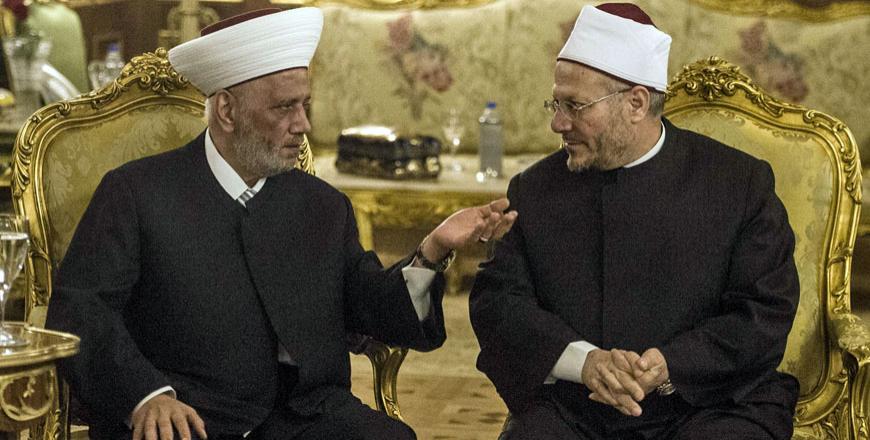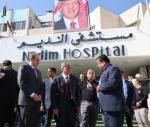You are here
Muslim scholars use Ramadan to push for an Islamic renewal
By AP - Jul 17,2015 - Last updated at Jul 17,2015
ABU DHABI — During the holy month of Ramadan, Muslims are called on to reflect on their faith as they conduct their daily fast. This past month, some clerics and scholars reflected on ways to reform the religious discourse in Islam to keep up with modern-day challenges and oppose extremism.
A popular Egyptian religious figure used his daily TV show to talk about ways to renew interpretation of Islam's holy book, the Koran. The United Arab Emirates hosted a series of Ramadan mosque lectures by dozens of clerics, including many from Al Azhar, Egypt's premier Sunni Muslim centre of thought and learning, and a popular American sheikh, who warned that renovation is needed in Islam after centuries of neglect in thought left the Muslim world in disrepair.
On one level, the religious reform effort — known in Arabic as "tajdeed", or "renewal" — is aimed at drawing the faithful away from extremism at a time when militant violence has escalated in the region with the spread of the Daesh terror group. A common theme among renewal-minded clerics is a call for greater emphasis on tolerance of others. On another level, the movement faces a struggle in revamping how the faith is practiced without altering its foundations.
Talk of change rose to the fore in January, when Egyptian President Abdel Fattah Al Sisi called for a revolution in Islam, saying outdated interpretations made the Muslim world a source of destruction. He urged government clerics and the 1,000-year-old Al Azhar to carry out this change. On Tuesday, he broached the subject again, saying "tolerance is disregarded by extremist interpretations" of Islamic texts.
Critics of Sisi have accused him of using this effort to purge religious institutions of his Muslim Brotherhood opponents and control another arm of the state's levers, in this instance a religious institution that is already weighed down by bureaucracy and government meddling.
But he also has strong regional support from the oil-rich emirate of Abu Dhabi, the UAE's seat of government. The UAE's counterterrorism lectures, organised by Abu Dhabi's Islamic Affairs Authority during the month of Ramadan, which ends Friday, drew more than 300 speakers, many of them from Cairo's Al Azhar.
Among the best known speakers in the lectures was an American from California, Sheikh Hamza Yusuf, who converted to Islam almost 40 years ago. He is a founder of Zaytuna College in Berkeley in 2008, the first accredited Muslim college in the United States.
Speaking to a crowd of mostly young professionals of various ethnic backgrounds in the UAE, he acknowledged that "our scholars have not responded properly" to current challenges quickly enough. He urged a return to the core tenet of mercy in Islam. People in the audience asked him questions ranging from how Muslims should react to the US Supreme Court's gay marriage decision to whether "Catcher in the Rye" was appropriate summer reading material for a ninth grader.
Speaking to The Associated Press later, the 58-year-old Yusuf described Islam as a house that has been neglected and is in need of renovation.
"The water taps aren't working, the plumbing's not working. The house is in disarray. It's derelict," he said. "The house is dilapidated. You don't destroy it, you don't set it aside. You renovate it." He said Muslims should not oppose even strong reforms, nor feel that everything needs to be changed.
"Because of the urgency of the situation, some people are waking up ... and thinking we better do something," he said.
In his sermon at an Abu Dhabi mosque, Sheikh Maher Amer, a scholar of Shariah at Al Azhar, underlined traditions of tolerance between Muslims and Christians.
Al Azhar has come under criticism, even from some supporters of the Egyptian president who call its teaching methods outdated and its efforts at change slow. Amer defended the institution, saying "all the sons and daughters of Islam, Arabs and Westerners, come to learn at Al Azhar, to learn its moderate and peaceful doctrine".
Efforts to reform Islam are nothing new. For centuries, Muslim theologians, jurists, poets and scientists advanced not only their understanding of how Islam applied to the times, but also advanced philosophical debates and the sciences like medicine and math.
But one of the Arab world's most famous Muslim televangelists, Amr Khaled, who dedicated his TV show through Ramadan to discussing ways of reform, pointed out that it has been at least 70 years since the last great work on Islamic jurisprudence was written. Some of the most widely sold books of Koranic interpretation today are 1,000 years old, he said.
"Life is running forward, but our understanding of religion is stagnant," Khaled told viewers.
That first episode garnered more than 240,000 views on YouTube and potentially millions more on TV. He then called on young people across the Arab world to join him in online discussions. He sought to apply Quranic teachings to life situation. For example, he dedicated three episodes to discussing how Muslims are called on by their faith to be dedicated to their work, but noted: "We are a society that does not produce or work."
"The whole idea of the show is that we can't know how to reform unless we see where life stands," he said. "How can you ask 'What can religion offer life?' when you don't know where life stands?"
Related Articles
CAIRO — Leading Muslim clerics meeting in Cairo on Tuesday called for moderation in issuing religious edicts, in an attempt to counter extre
An anti-terrorism conference in Saudi Arabia attended by Muslim clerics from around the world has ended with leaders calling for reform in religious studies to promote moderation and tolerance.
CAIRO — In a rebuke to the Egyptian government, the top religious scholars of Egypt’s Al Azhar have rejected new government measures to stan
















